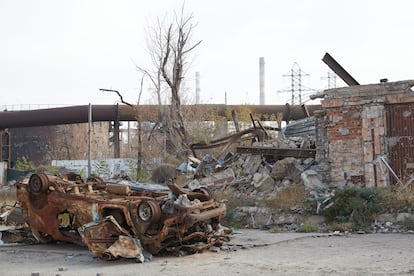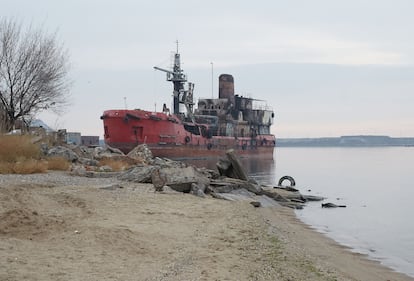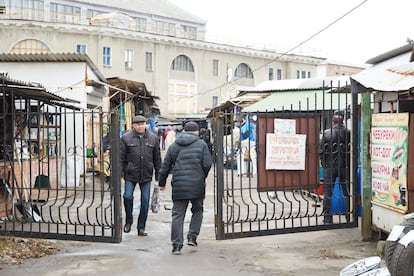Mariupol and Donetsk after a thousand days of war: ‘We want peace and quiet’
EL PAÍS enters an area of Ukraine controlled by Moscow. Complaints about poor reconstruction contrast with the sense of ‘liberation’ expressed by the pro-Russian residents


Mariupol fell at the end of May 2022, after almost three months under Russian siege. More than 80% of its houses were destroyed and thousands of civilians were killed in the offensive launched on the eastern Ukrainian city. The total death toll is not yet known.
A thousand days after the outbreak of the war, workers from Russia are rebuilding the city. On doors pockmarked and scarred by shrapnel and shells, the word “People!” can still be seen, indicating that defenseless civilians were hiding within. The ruins of the impressive Azovstal metallurgical complex dominates the city. The Russian authorities who now control the region want to demolish it to build a technology park, although their overall aim is to turn the city into a beach destination for Russians. Mariupol had more than 420,000 inhabitants before the war. Today there are far fewer. Some streets in the center are buzzing with activity, others are deserted.
At night, three women stroll past the ruins of a kindergarten in the suburb of Azovkoltso. “[Before] everyone spoke Ukrainian, Russian, whatever you wanted, no one harassed us,” says Raisa Ivanovna, 75. The war caught them and their families by surprise. “I didn’t know if it was just a dream. We woke up to the shelling. We spent a month in the cellar,” adds her sister Nina, 68.
The women were evacuated to Berdiansk, southwest of Mariupol, which was already controlled by Russia. Returning to Mariupol, they were given Russian passports within the space of 10 days. They view the reconstruction of the city with optimism. “There are stores, pensions are coming through bit by bit, there are drugs in the pharmacies,” says Raisa. None of them know whether they feel they have been liberated: “From whom? It’s like a dream, we don’t understand anything,” they say. All they ask for is “peace and quiet.”
Complaints in the new neighborhoods
Russian president Vladimir Putin paid a fleeting visit to Mariupol one evening in March 2023. He toured the Nevsky district, a newly built neighborhood that symbolizes the Kremlin’s efforts to restore what it calls its “new territories.” Moscow has allocated some 1.3 trillion rubles (€13 billion) for the rebuild over the next three years, according to estimates by the Russian independent media.
“It looks good on the outside, but inside it’s very poorly done,” says a local who wishes to remain anonymous and whose home burned to the ground. She shows us inside the block, which has no elevator: “The walls are plaster, there are holes in them, and the whole bathroom is plastic,” she says, stressing that her new apartment was given to her empty. “I lost everything. I had a renovated three-room apartment, with my furniture and my clothes,” she says.
Her neighbors join in. One couple arrives at the apartment with a small child and complains about the quality of the building, whose floor the neighbors themselves had to repair. “I hate this world. I want to go back to my Mariupol, to my apartment. I’m sorry, guys,” a third woman in her 60s says, before closing the door.
Pro-Russians in Mariupol
Other Mariupol residents, however, are celebrating the arrival of Russian troops. “I felt liberated, I didn’t feel like an equal before,” says Alexander, a former sailor who owns a hostel on the coast. Born in the Russian city of Nizhny Novgorod, he moved to Mariupol in 2000 after marrying his wife. “After 2014 [the year of the Maidan uprising and the Donbas war, in which Ukraine was able to retain control of the city] I began to feel like a second-class citizen,” he says. Alexander complains that the Ukrainian authorities did not recognize his Russian driver’s license despite it being international and believes that in any legal proceedings, he would have lost on account of his pro-Russian credentials.
The war took him by surprise during a trip to Russia. His wife and daughter were caught in the fighting and he lost contact with them. After an odyssey that included hundreds of miles on a bicycle, he obtained a pass from the Ukrainian forces and he and his family were reunited. Three days earlier, his wife had been wounded by shrapnel.

Today, the Russian flag hangs in front of their hostel together with one from the days of the Tsar. With the city under Ukrainian control, his house was painted in the three Russian colors, red, blue and white. “There was never a complaint,” he says. “It’s not just a flag. I love Russia.”
Vyacheslav, 70, strolls through the center of Mariupol. He is pro-Russian but adds that the Russian authorities have offered a meagre 7,000 rubles (€70) per square meter for repairs and believes that they will “nail them with taxes” in the future. He has four apartments that he wanted to rent out “so as not to have to work.” The plan was to move to Alicante in Spain, although he believes that in Spain “the Russian-speaking population are discriminated against.” He says the same about the Ukrainians, whom he accuses of imposing their language. “I hate the Khokhli [derogatory Russian term for Ukrainians] – there was a forced Ukrainization here.”
Vyacheslav has four children. He keeps in touch with three: the youngest, another who took part in the pro-Russian protests of 2014, and a third who lives in the Ukrainian zone, in Kharkiv, whom he considers “neutral” because of his indifference to the war. He doesn’t speak to the fourth, who is a fire chief in Kyiv. “Too much polarization,” he says.
In the city center, there seem to be more soldiers than usual. In fact, they are Russian actors. Director Alexander Repenko is filming a series for Russian state television. It’s about security officers investigating sabotage by young Ukrainians. “They have been brainwashed for years. If it was a pro-Russian city before, in 2022 it was absolutely pro-Ukrainian,” he says.
Repenko calls the Oscar-winning documentary 20 Days in Mariupol propaganda, and reiterates that the Kremlin’s mission is to “denazify Ukraine.” Asked about the exchange of 215 prisoners of war for Putin’s ally, the former Ukrainian member of parliament Viktor Medvedchuk, the director says: “We were expecting a trial. It was one of those political deals that, unfortunately, cannot be avoided.”
Donetsk, a 10-year odyssey
The trip to Donetsk is this journalist’s first return to the city after 10 years. In January 2014, no one in eastern Ukraine was talking about joining Russia, though they were suspicious of the Maidan uprising protesting Ukraine’s President Viktor Yanukovych’s decision not to sign European Union-Ukraine Association Agreement, and instead choosing closer ties with Russia. After Yanukovych stepped down, there were pro-Russian demonstrations in the east of the country, but they fizzled out. Subsequently, Russia sent in paramilitaries to encourage more protest. “We understood that the demonstrations were pointless and a dead end. There was no willingness to go all the way. Donbas people are simple people, with little initiative. They are very obedient,” said the then head of paramilitary communications, Sergey Tsiplakov, in the book 85 Days in Slavyansk.
The so-called Donetsk People’s Republic is undergoing severe deindustrialization. There are plenty of young people about, but many factories and offices are abandoned, and prices have soared. According to the daily Novorosiya, the average salary is around 27,000 rubles a month (€270 euros) compared to 77,000 rubles in Vladivostok (€770 euros).
“A lot of immigrants have come, but many of our people left or are on the front lines. Many people have died,” says Vyacheslav Morskoy, a 46-year-old Russian bricklayer who moved to Donbas as a young man and works from Monday to Sunday to feed his family. “I am glad to be in Russia, Ukraine has never existed,” he adds. A former footballer, he has a keen memory of when the Shakhtar Donetsk stadium hosted Real Madrid and Barcelona in the Champions League.
Days before Russia launched its full-scale invasion of Ukraine in 2022, the Luhansk and Donetsk authorities ordered men between 18 and 55 to sign up. Thousands were immediately sent to war in Donbas and Mariupol. Morskoy was not called up because of an eye problem. Although he is in favor of conscription, he does not agree with how it was carried out: “You need at least a month to prepare yourself, to learn how to shoot,” he says. “They grabbed people in the markets. We were mobilized by force, but our Putin gave them [the perpetrators] hell. He fucked them up good for this, and that was the end of it.”
The city lives under curfew, but there are a couple of bars where young people can spend the weekend. Yegor and Mark, 18, are musicians and play in a band called Out of Mind. “If Russia hadn’t launched its offensive, we would have been crushed. 2014 would have happened again,” Yegor says. His friend adds, “Was [the war] necessary? We don’t know 100 percent what would have happened, but hope for the best and prepare for the worst.” The two refuse to enlist voluntarily. “No way, we wouldn’t go voluntarily,” Yegor says, although he insists that he wouldn’t try to escape conscription either. “We have our own ambitions in life,” says Mark.
Other young people feel the same way. At the bus station, Vania and his 16 and 17-year-old friends, all basketball players, don’t want to go to war either. “Of course not,” they say, although they are grateful that the city is more peaceful, “thanks to the fact that the front has moved.”
Sergey, a 55-year-old contract soldier, fought in 2014 as a volunteer with the pro-Russian separatists. “Now a war is being fought between good and evil,” he says during a religious service in the Holy Transfiguration Cathedral. “We have the homosexual minority coming to us from Europe. This is wrong. A man must be a man, a woman must be a woman,” he says after accusing Kyiv of being the West’s puppet.

The damage to the cathedral from a Ukrainian shell has just been repaired. Priest Nikolai thinks that the war is a test from God. “Nobody asks ordinary people. The government made all the decisions and all we can do is accept the consequences,” he says before insisting there should be no hate for anyone on the Ukrainian side: ‘For a Christian, there is the principle of hating the sin, but loving the sinner.’
Close to the front
While peace reigns in Donetsk, in Gorlovka, a dozen kilometers from the front, the situation is very different. The town has been part of the separatist zone since 2014, but the contact line has edged into Ukraine and has hardly moved since 2022. The sound of explosions and artillery fire goes on night and day; only bad weather cuts the number of drones flying over the city.
Gorlovka had more than 240,000 inhabitants before the war. Ukrainian shelling has left it without electricity. The town is plunged into absolute darkness, except for a few windows where stand-alone generators are running. The authorities say around 60,000 residents have been affected, meaning the remaining quarter of the population, and say the blackout will last for another week. “It’s the first time it’s happened to us in years,” they say at the hostel.
“We are afraid, but we go on living,” says a 35-year-old clothing vendor at the local market. She has an 11-year-old daughter and is scared to leave her at home. The previous day, several civilians were killed in an artillery attack just a few hundred meters from her stall. “Three years ago, there was no shelling in the city. Now people are afraid, they don’t come to the market. Before, our children used to go out to the playground, now they study at home.”
Liliana sells sweets and candies inside the main market. Like many locals, she wants to remain part of Russia. “We have lived in this hell since 2014 on the front line. If there is a war, the military fights on the frontline, they don’t attack the population,” she says, explaining she has a daughter on the Ukrainian side. “I haven’t been able to see her since the war started. She is a doctor, and they won’t let her leave.”
Sign up for our weekly newsletter to get more English-language news coverage from EL PAÍS USA Edition
Tu suscripción se está usando en otro dispositivo
¿Quieres añadir otro usuario a tu suscripción?
Si continúas leyendo en este dispositivo, no se podrá leer en el otro.
FlechaTu suscripción se está usando en otro dispositivo y solo puedes acceder a EL PAÍS desde un dispositivo a la vez.
Si quieres compartir tu cuenta, cambia tu suscripción a la modalidad Premium, así podrás añadir otro usuario. Cada uno accederá con su propia cuenta de email, lo que os permitirá personalizar vuestra experiencia en EL PAÍS.
¿Tienes una suscripción de empresa? Accede aquí para contratar más cuentas.
En el caso de no saber quién está usando tu cuenta, te recomendamos cambiar tu contraseña aquí.
Si decides continuar compartiendo tu cuenta, este mensaje se mostrará en tu dispositivo y en el de la otra persona que está usando tu cuenta de forma indefinida, afectando a tu experiencia de lectura. Puedes consultar aquí los términos y condiciones de la suscripción digital.








































